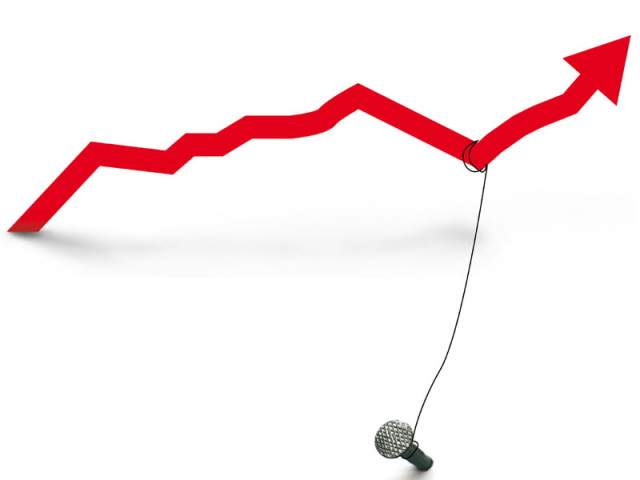Gradual slowdown: Inflation dips to 9-year low despite govt borrowing
Slow pace of price rise paves the way for interest rate cut.

For the current year, which is going to end in June, the average inflation target has been revised downward to 9% from the earlier 9.5%. DESIGN: ANAM HALEEM
Inflation in Pakistan slipped to a nine-year low in April despite an expansionary fiscal policy pursued by the finance ministry, underlining the need for a review of the calculation methodology that is showing a rapid slowdown in the pace of increase in prices of essential commodities.
Inflation measured by the Consumer Price Index, the most closely watched barometer, clocked in at 5.8% in April over a year ago, according to the Pakistan Bureau of Statistics. This is the lowest level since April 2004 when CPI inflation stood at 5.99%.
The declining rate of inflation has provided room for a reduction in interest rate in the next monetary policy. According to sources in the State Bank of Pakistan, in the last monetary policy the policy-setting committee discussed the possibility of cutting the discount rate, but the idea was dropped for the time being and until the new government takes over.
Since May 2012, when the last government introduced some changes in the calculation methodology, the pace of increase in prices of essential commodities has been slowing down. In May last year, inflation was recorded at 12.3%.
Experts are calling for a review of the methodology, considering the results contrary to ground realities. According to the State Bank of Pakistan, from July 2012 to April 19 this fiscal year, the federal government has borrowed Rs827 billion for budget financing from commercial banks and the central bank. This is in addition to Rs360 billion that were raised through the National Savings Schemes.
Defending the figures, Chief Statistician of Pakistan Asif Bajwa said high domestic borrowing did not have any impact on inflation as it was substituting negative net foreign assets. He said the high base impact was another reason behind the slow increase in prices of essential commodities.
However, experts attribute the reduction to changes pertaining to data collection for house rent and gas prices, which have almost 25% weight in the CPI basket. Previously, the PBS calculated the change in house rent, which carries 21.82% weight in the CPI basket, by taking the average rent for 24 months.
Now, the house rent is calculated on the basis of monthly rental survey, which is termed distortive and far from reflecting real change. The house rent increased 7.7% in April over a year ago.
Similarly, the government has reduced gas slabs from four to three, leading to a decrease of 46% in prices every month since the change took place. In April again, gas prices dropped 46.1% over a year ago, according to the PBS. Gas prices have a 1.58% weight in the CPI basket.
Core inflation, excluding volatile fuel and food prices, eased to 8.7% in April over a year ago. Experts give more importance to core inflation as an indicator that is not affected by seasonal price shocks due to exclusion of food and energy items. But they do not accept the figures, saying the trend goes against economic theories.
Average inflation in first 10 months (July-April) of the current fiscal year remained at 7.75% over the same period of previous fiscal year, according to the PBS.
For the current year, which is going to end in June, the average inflation target has been revised downward to 9% from the earlier 9.5%.
Published in The Express Tribune, May 3rd, 2013.
Like Business on Facebook to stay informed and join in the conversation.












1724319076-0/Untitled-design-(5)1724319076-0-208x130.webp)






COMMENTS
Comments are moderated and generally will be posted if they are on-topic and not abusive.
For more information, please see our Comments FAQ